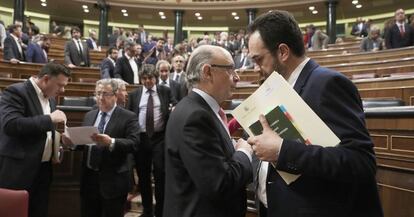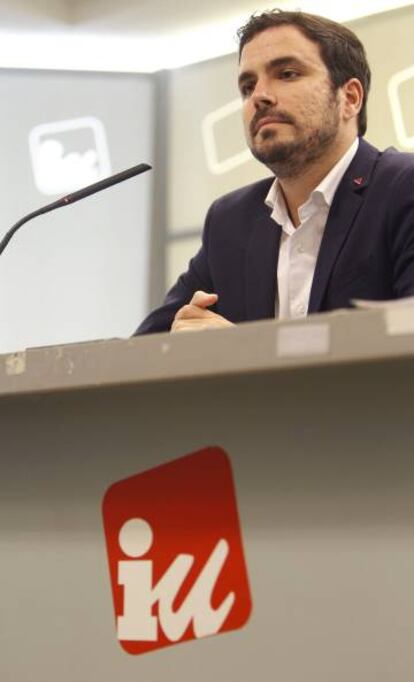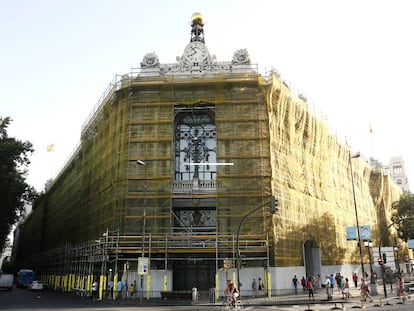Spanish Congress poised to greenlight investigation into banking crisis
Deputies expected to vote in favor of a committee to examine the bailout of Spain¡¯s saving banks
Spanish Congress is almost certain to approve the creation of a special committee to investigate the banking crisis and the bailout of Spain¡¯s struggling savings banks. In January, the Audit Court released a report showing that up until December 2015, the cost of restructuring Spain¡¯s bankrupt savings banks had totaled €60.7 billion, of which nearly €41.8 billion was paid for by taxpayers.

The deputy for the leftist Unidos Podemos group, Alberto Garz¨®n, has managed to introduce the issue on the agenda of the plenary session scheduled for next Wednesday, February 22. On that day, Congress will debate whether to appoint an investigative team to look into the Bankia flotation and bailout fiasco, among other failures of the Spanish banking system during the economic crisis, when excessive exposure to real estate risk dragged many regional lenders into the red.
¡°Now more than ever, there is a pressing need to create a parliamentary committee to investigate the bailout of the savings banks, in order to put a name and a face to the people who were responsible for the economic crisis,¡± said Garz¨®n.
Once the committee is approved, there will be a new hurdle: actually putting it together
Within the board that approved the agenda for next week¡¯s plenary session, only the ruling Popular Party (PP) opposed the creation of an investigative committee. This practically guarantees that it will become a reality, given that the PP is in a minority position in Congress.
Faced with the inevitable, PP spokesman Rafael Hernando said that ¡°it is good to investigate the workings of the financial sector during that period¡± despite the judicial inquiries that have already probed the matter.
The main opposition Socialist Party (PSOE) had pledged some time ago that it would support the creation of such a committee, and the reform party Ciudadanos will likely support it too, since it has attempted to push forward a similar, more wide-ranging investigative committee in the past. And the Basque Nationalist Party (PNV) has already confirmed its affirmative vote next week.

Meanwhile the Socialists, the Catalan Republican Left (ERC) and the Valencia party Comprom¨ªs have all filed similar petitions for committees, but limited to the Bankia case only. The former head of Bankia and ex-IMF chief, Rodrigo Rato, was once a senior figure within the PP who is now facing several criminal investigations.
Earlier this week Spain¡¯s central high court, the Audiencia Nacional, decided to formally investigate former Bank of Spain officials, including ex-governor Miguel ?ngel Fern¨¢ndez Ord¨®?ez, for their failure to prevent the Bankia debacle despite their supervisory roles.
Once the committee is approved, however, there will be a new hurdle: actually putting it together. There is an unwritten rule in Spanish Congress that two investigative committees never work simultaneously. A special committee was approved last September to investigate the role of the Interior Ministry in a case involving fake accusations against political rivals, but the PP and PSOE have blocked the appointment of members, falling back on the fact that Jorge Fern¨¢ndez D¨ªaz, the former interior minister, is recovering from surgery.
In the more than six months since the new Congress was formed, not a single investigative committee has actually come together to carry out any work.
English version by Susana Urra.
Tu suscripci¨®n se est¨¢ usando en otro dispositivo
?Quieres a?adir otro usuario a tu suscripci¨®n?
Si contin¨²as leyendo en este dispositivo, no se podr¨¢ leer en el otro.
FlechaTu suscripci¨®n se est¨¢ usando en otro dispositivo y solo puedes acceder a EL PA?S desde un dispositivo a la vez.
Si quieres compartir tu cuenta, cambia tu suscripci¨®n a la modalidad Premium, as¨ª podr¨¢s a?adir otro usuario. Cada uno acceder¨¢ con su propia cuenta de email, lo que os permitir¨¢ personalizar vuestra experiencia en EL PA?S.
?Tienes una suscripci¨®n de empresa? Accede aqu¨ª para contratar m¨¢s cuentas.
En el caso de no saber qui¨¦n est¨¢ usando tu cuenta, te recomendamos cambiar tu contrase?a aqu¨ª.
Si decides continuar compartiendo tu cuenta, este mensaje se mostrar¨¢ en tu dispositivo y en el de la otra persona que est¨¢ usando tu cuenta de forma indefinida, afectando a tu experiencia de lectura. Puedes consultar aqu¨ª los t¨¦rminos y condiciones de la suscripci¨®n digital.










































